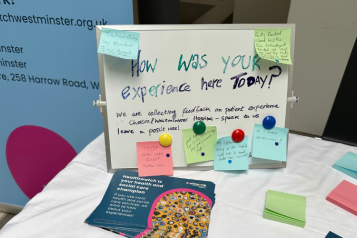How is Healthwatch Westminster addressing the mental health needs of homeless people in the borough?

Download the full report here
Why did we develop this project?
Westminster has the highest rate of homelessness in London, with the borough having the highest number of rough sleepers. Additionally, our community mental health projects and the feedback we receive through targeted outreach indicate that additional support is necessary to address the mental health needs of individuals experiencing homelessness in Westminster.
Therefore, our aim was to explore the mental health needs of homeless individuals and identify existing gaps in primary mental health care. Furthermore, we wanted to investigate the impact that demographic factors – including age, gender, language proficiency, or ethnicity – may have on homeless groups’ experiences, access, or quality of care received.
How we carried out this project
We collected data over two stages. During the first stage, we conducted an online and in-person survey for service users, which we devised and reviewed together with key stakeholders and professionals that serve homeless communities' mental health needs. The survey delved into several topics such as participants’ previous mental health experiences, their interactions with mental health and wellbeing services and the factors that positively and negatively impact their mental health.
In the second stage of data collection, we conducted focus groups and individual interviews with service providers and professionals who support homeless people with mental health needs. We also administered 13 in-depth semi-structured interviews with key stakeholders, such as from healthcare services and charities. The interviews allowed us to understand key issues around service users' experiences with accessing and obtaining mental health care and whether demographic factors impact access to and quality of care. The full report summarises the input from 13 service providers who support over 1,000 homeless people with mental health needs, as well as two survey responses from service users.
What we found
Respondents reported that access to mental health services was hindered due to reasons such as high thresholds to receive support, stigma, fear of impact on migration status, digital exclusion and language barriers.
Many respondents also touched upon the quality of mental health care received and how factors such as lack of funding, poor continuity of care and the absence of a trauma-informed approach make it increasingly difficult to provide adequate and high quality mental health care. The report delves further into these findings.
Our recommendations
Our recommendations address the feedback shared by 15 participants across the survey responses and interview discussions. We emphasise on the need to provide good continuity of care, address mental health stigma and improve staff training and resources to better support homeless communities. You can read more about our recommendations in the report.
What’s next?
We are hosting a co-production event in August to discuss our findings on homeless people's access to primary mental health services in Westminster. Homeless individuals, those with lived experience of homelessness and mental health, mental health service providers, and community organisations working with homeless people in Westminster are invited to attend. Findings will inform our ongoing work on the health and well-being of homeless individuals and will be shared with key partners.


